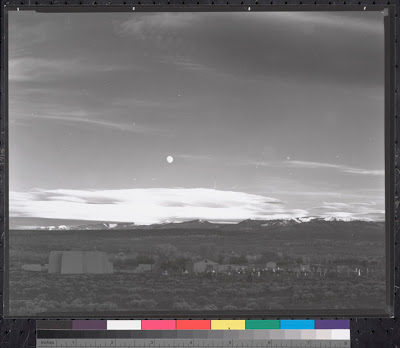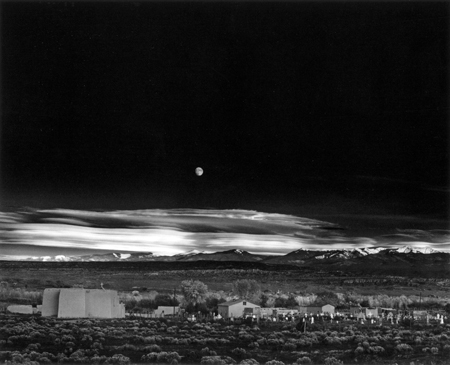Can artistic vision be learned or is it more of an instinct that you either have or you don't
Jan 25, 2018 00:02:22 #
I have no artistic ability nor do I even have the ability to understand what makes one better than the other, and as such I can not tell a good photo from a bad one, within reason. Perhaps to be more accurate I should really say that I can not tell a good one from a great one. Be forewarned that the rest of this post is all about me. Just to give some insight into my experience I will tell you the following. When I was 9 I inherited a newspaper and I kept most of the photography equipment they had. I had a good negative projector for printing pictures, along with a Yashica, a Pentax, a Miranda and lastly a GAF along with various lenses light meters, filters and etc. They were all 35mm SLR's from the 60's and early 70's. I taught myself black and white developing and printed my own pictures, but I never liked any of my pictures. It was less than a decade before I lost interest in photography due to my lack of ability. I knew how to use the cameras from a mechanical standpoint, but that is all. Then after I got older and began working as an engineer I purchased a few digital point and shoot cameras to document what I worked on for my customers and for my own records, but nothing that was meant to be artistic. It was mostly just pictures of damaged machinery and equipment components and cracks in decks, bulkheads, and hulls and other various problems that I was hired to correct, or discrepancies that I found in the course of my work that needed to be repaired before they caused additional problems along with after photos of the same items after I performed the necessary repairs. Although I suppose that from a macro perspective some of them might have possessed artistic qualities, it was never my intention. Recently I bought a D5300 and a D3400 and my hope is to learn everything I can about using all of their features, and then maybe if I am lucky some of the photos that I take will be worth keeping. I do not expect to be able to consistently create photos that anyone would want to hang on a wall, but I am hoping that someday I may be able to look through the viewfinder and think, "I might even keep this one." I'm not going to get my hopes up though because I have very little natural artistic ability or imagination outside of the realm of engineering. I can make technical drawings but anything else but stick figures is beyond me. I lost my soul mate in 2008 which broke my heart, and I broke my back in 2010 which left me paraplegic and has really changed my perspective on just about everything and I now experience emotions that I never felt before, mostly just extreme sadness, but I do feel emotions now where before I was basically limited to feelings of only happiness and anger. I mention this because in my experience artistic people are also very emotional. I would be interested in learning to see the world with an artistic vision and be able to capture images that makes someone, anyone, stop and say "wow, that picture is really cool," if that is even possible... And now back to my question, can I learn to take amazing photographs or is that really only possible for individuals with brains that are wired with an inherent natural artistic ability?
Jan 25, 2018 00:42:53 #
Do yourself a favor - forget the technical aspects of photography for a while. recover that P&S camera and learn to shoot pictures then learn the technical aspects of Photography.
You may never comprehend a good photograph (I have worked with MEs before) a good photography composition course may allow you to fake it adequately.
Seriously, there are people that naturally see with an artistic vantage point but will never understand the technology of a camera, and there are people that can only look at photography and see the rays of light bending through the refractor and will understand how those photons create a voltage and how that is converted to bits. Most people lie somewhere between those two extremes.
The physical blessing you have received will give you the patience to study a scene and choose how to present that scene to allow you to tell the story you want/need to tell. With a composition course and being able to understand how the human brain processes photos, I believe you will astound yourself.
Good Luck and post a picture here every now and then and there are those here that will help you.
You may never comprehend a good photograph (I have worked with MEs before) a good photography composition course may allow you to fake it adequately.
Seriously, there are people that naturally see with an artistic vantage point but will never understand the technology of a camera, and there are people that can only look at photography and see the rays of light bending through the refractor and will understand how those photons create a voltage and how that is converted to bits. Most people lie somewhere between those two extremes.
The physical blessing you have received will give you the patience to study a scene and choose how to present that scene to allow you to tell the story you want/need to tell. With a composition course and being able to understand how the human brain processes photos, I believe you will astound yourself.
Good Luck and post a picture here every now and then and there are those here that will help you.
Jan 25, 2018 02:23:06 #
nauticalmike wrote:
I have no artistic ability nor do I even have the ... (show quote)
"Artistic vision" is too subjective a concept to categorize one way or another. You only have to look at the comments to photos posted on this forum. Some people love a particular photo; others think the same photo stinks. The iPhone is another great example. Some people rave over its minimalistic style. Others find it frustrating that you need to dig down several menus layers to perform simple tasks.
The bottom line is instead of trying to take a photo that others will say is cool, just try to take photos that appeal to your "artistic vision." I play the violin, and I know I will never be the next Heifetz. But I enjoy playing, and the fact that the music critic at the New York Times may think I stink does not bother me.
Jan 25, 2018 04:12:44 #
wdross
Loc: Castle Rock, Colorado
nauticalmike wrote:
I have no artistic ability nor do I even have the ... (show quote)
The short answer is "Yes! You can learn to take amazing photos." There is always a lot to be learned on the technical side and some of the artistic will come to you while studying and learning the "Rules". Anytime you dispare about something, just get on line and let us know. We will do our best to get you over "the hump".
Jan 25, 2018 05:27:27 #
nauticalmike wrote:
I have no artistic ability nor do I even have the ... (show quote)
When a student approaches me with a similar query, this is how I respond:
What is the quality in an image that you see that makes you stop and say "wow, that picture is really cool" - and therein lies key unlock the door to your creative side. The other side of that coin -what makes you not stop when you see an image?
Then we have a brief discussion about what is it about a scene that prompts them to lift the camera to their eye and snap the shutter for that particular image. What is it about what they see that compels them to record an image in a particular way, and most importantly, are they merely recording an image as a document that they can refer to in the future to trigger memories of being there, or are they "creating" a unique view - an artistic vision - that has not been done before and speaks to a different perspective.
People often get to a frequently photographed location and climb over each other to get "the shot" - think of Niagara Falls. You've seen postcards, illustrations pictures in travel brochures, images on social media, etc - and they are all pretty much the same. What I tell my students is to do exactly that - go take the same picture everyone else has taken. Then return later in the day or the following day, and take a picture of the same subject, then do it in a way that very likely has not been done - the way YOU, as the photographer/artist see it and would like others to see it.
Another way to approach this is to arrive at a place and stop. Leave the camera in the bag, and just experience the setting. Sound, smell, temperature, wind, precipitation, fog, visual elements like contrasting colors, textures, light and shadow, forms - all of these things are dynamic and fluid and unique to the time of the experience. Once you are comfortable that you have "taken it all in" then take out the camera and try and capture the sum of what you just experienced. The real challenge is to return to the same setting and do the exact same thing, and see how different your response will be and how that manifests itself in the picture(s) you end up taking. This is a way to unlock different parts of your brain and allow you to develop a unique perspective.
If you like the second idea, use google to find everything you can read on "Contemplative Photography." You may find it interesting and helpful.
The second part of creating an "artistic" image, or one that has that "WOW" factor is how you envision you will treat the image in post processing. There are may who will profess, with an air of superiority, that they "get it right" in the camera, and do not "manipulate" an image after it's been taken. Kudos to them. However, it has always been the case in creative or artistic photography, that pressing the shutter is only the first step in the creative process, and that many images lend themselves to artistic interpretation in the form of creative post processing. One of the best known before and after examples of this is the image taken by Ansel Adams entitled Moonrise over Hernandez. What his camera "took" was a pretty drab and uninteresting scene - but his creative vision saw something else. You be the judge with regard to the value of post processing and image manipulation. The purists may have tossed the negative into the circular file. It's a good thing that Adams was not "that" kind of purist . . .
.
.
straight out of the camera

after years of revisiting the image, heavily post processed to reveal his vision

Jan 25, 2018 08:31:42 #
SS319 wrote:
The physical blessing you have received will give you the patience to study a scene and choose how to present that scene to allow you to tell the story you want/need to tell. With a composition course and being able to understand how the human brain processes photos, I believe you will astound yourself.
The physical blessing you have received will give you the patience to study a scene and choose how to present that scene to allow you to tell the story you want/need to tell. With a composition course and being able to understand how the human brain processes photos, I believe you will astound yourself.
I can not even begin to comprehend how anyone could possibly view an SCI and all of the associated health problems to be a "physical blessing!" The only aspect I concede could be even worse is that I have no feeling in my groin so I do not feel additional pain from inserting a catheter every time I pee. Of course the downside to that is that I am also incapable of experiencing an orgasm.
Otherwise thank you for your post it did give me something to think about...
Jan 25, 2018 08:38:39 #
Gene51 wrote:
When a student approaches me with a similar query, this is how I respond:
.
.
Thank you for your insight.
Jan 25, 2018 09:54:59 #
nauticalmike wrote:
I have no artistic ability nor do I even have the ability to understand what makes one better than the other, and as such I can not tell a good photo from a bad one, within reason. ...
That may or may not be true!
You can't learn artistic talent, but you can determine what about art you do like, and then learn the ability to produce exactly that kind of art. It probably won't make you famous but could make you very satisfied, very happy, and very competent.
First, is there such a thing as either a painting or a photograph that you like better than others? If you go to an art museum, or look at photography books in a library, or look at images on the Internet are there any (out of a few thousand) that always attrack your attention each time you see them? One key is if you pass by the same images instantly every time because they just do not mean anything to you, but just as instantly seem to always stop at the same few every time even if it is six months since you've seen it.
If you can scan a wall full of images and in 10 seconds say that none of them appeal to you, or that this or that one for some reason do... you want to study very closely what there is in common for the ones you like. Then learn what makes photographs with those characteristics. The commonalities may be subjects, or may be composition, or a genre or a style within a genre. They may be images that most other people also like, or might be what almost nobody likes.
Learning to make art (photography) that is specifically what you enjoy is vastly more fun, not to mention easy, than understanding what others like.
Jan 25, 2018 10:05:03 #
Artistic vision cannot be learned. It must be unlocked. You can learn the craft of photography (or painting or acting or dance...) but only by challenging yourself and the "rules" of the craft can you unlock artistry. Keep learning the craft and applying it and while you do ask yourself; What excites me about what I am about to shoot? How can the craft help me communicate that excitement? What can I do to go beyond what I know of the craft?
Jan 25, 2018 10:41:16 #
You have received some good advice as I see it, who am and artist and who taught art appreciation for many years. Bottom line(s): At least some degree of artistry (feeling, and knowing how to put things together [composition]) is possible for nearly everyone. Next, be aware of your feeling when your camera is in hand, and start looking through the viewfinder or screen for something that you feel reflects your mood. Shoot tens of pix. One in ten might strike you when you get home. Take that pic and figure out what MOST expresses your feeling. Bring that out (there are many ways, and a course or book on photo composition can get you started).
Note "get you started." ALL good artists started with a personal interest, and generally worked through their cliché works, until they found something that ended up being recognized by others.
Note "get you started." ALL good artists started with a personal interest, and generally worked through their cliché works, until they found something that ended up being recognized by others.
Jan 25, 2018 12:19:40 #
you can have the most creative mind, but if you don't know how to use the tools you will probably never be anything special.
Jan 25, 2018 13:15:24 #
nauticalmike wrote:
I have no artistic ability nor do I even have the ... (show quote)
Yes, it can be learned, if you train yourself and stick to it, but a person that has that ability to begin with, will always have an advantage (as they too will continue working on it and better themselves)!
Jan 25, 2018 13:50:52 #
If you really cannot appreciate beauty in pictures, cannot be wowed by any pictures you see, and have no personal reaction to good pictures vs. great pictures, I don't know how you would be able to produce great pictures, unless you copy the pictures that other people think are great. Most of us who do art as a hobby will never produce great art. It has to be enough to produce pretty good art if possible. Painters learn to paint by copying paintings, musicians learn to play and sing by copying recordings, photographers can learn to be better photographers by copying pictures that they and/or others like. Only a few people out of billions create unique art. For the rest of us we can hope to create decent copies. As most people eventually figure out when they try, being able to recognize and appreciate great art and being able to produce it are two totally different things.
Jan 25, 2018 14:02:31 #
nauticalmike wrote:
I have no artistic ability nor do I even have the ... (show quote)
Hi, Mike,
I entertain no question that artistic vision and “an eye” for creative imagery is a learned skill.
Early in my boyhood experience with photography I complained to my dad that I just did not have his “eye”. He told me that was why he was always looking at images in magazines, books, and “photography annuals” and dragging me along when attending photography art shows and art museums. He had, somewhere, come across a quote by Alphonse Bertillon, the great French detective and anthropometrist who said: “We see only that which we observe, and we observe only that which is already in the mind”. Dad had to explain that the more of which we become aware (learn), the more we use that awareness to expand what we observe.
Years later, during my training as a pathologist, 5hat same quote was used by one of my mentors to emphasize that only through the mind-expanding effort of seeing as well as thinking about as many examples as possible of as many different diseases and lesions, gross and microscopic, as possible does one’s mind’s awareness of the greatest range and spectrum of possibilities become possible.
So yes, an eye is developed, not inherited!
Dave
Jan 25, 2018 14:24:54 #
A fascinating read that will open your eyes in many ways: "Drawing on the Right Side of the Brain" by Betty Edwards. A bit of info:
"Your right brain is your nonverbal and intuitive brain; it thinks in patterns, or pictures, composed of ‘whole things,’ and does not comprehend reductions, either numbers, letters, or words."
http://drawright.com/theory/
You can apply much of what is taught in the book to photography composition and capturing the essence of your subject.
"Your right brain is your nonverbal and intuitive brain; it thinks in patterns, or pictures, composed of ‘whole things,’ and does not comprehend reductions, either numbers, letters, or words."
http://drawright.com/theory/
You can apply much of what is taught in the book to photography composition and capturing the essence of your subject.
If you want to reply, then register here. Registration is free and your account is created instantly, so you can post right away.







